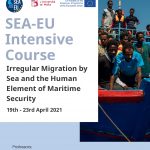SEA-EU OBSERVATORY FOR MIGRATION AND HUMAN RIGHTS
SEA-EU OBSERVATORY FOR MIGRATION AND HUMAN RIGHTS IN THE EUROPEAN MARITIME AND PORT EXTERNAL BORDERS
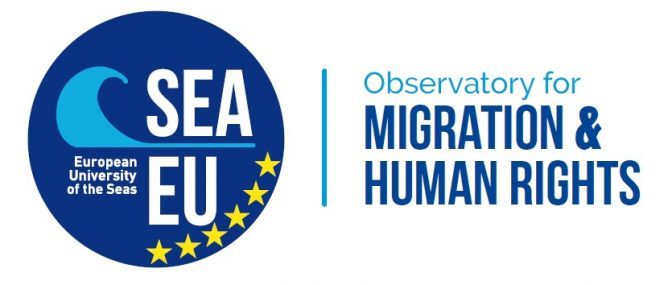
- University of Cadiz
- University of Kiel
- University of Gdansk
- University of Split
- University of Malta
- University of Western Brittany
A key binding factor that unites the Universities of our consortium SEA-EU, in addition to the sea, is that all of them are located in cities, territories or States that are external maritime borders or external port borders. The SEA-EU consortium would be constituted as a campus adapted at all times to the social and international problems of the territories and States that compose it. For this reason, the creation of a consortium of European Universities, made up of the Member States directly involved in the control of external borders, gives us the opportunity to unite ties and efforts, from higher education, to forge common identities in matters that affect us in the same way due to our border condition: border control policy, immigration, asylum and human rights.
There is a social problem common to the territories and environments of the SEA-EU partner Universities: the link to the sea and the need to deal with maritime migratory aspects. The peripheral nature of these Universities gives them a special value for analysing a common east-west and north-south European problem. The territory of the partner States, as States with external borders, is linked to the particular problems of borders and immigration: control of maritime and port external borders, immigration and human rights. The external borders of the European Union have been common since internal border controls were abolished and a new “European model of borders” was created with the Treaty of Amsterdam in 1997. Since 2015, however, with the so-called refugee crisis, the solidarity of the Member States of the Union in managing these external borders has been called into question more than ever.
Indeed, immigration is already a constant in European societies and an issue that occupies and will occupy a very important place among the values and issues of debate and regulation for European public opinion, governments and societies. In times of global financial crisis, the emergence of failed states on the international scene, and the perpetuation of challenges such as poverty, climate disasters, inter-ethnic and sectarian wars, terrorism and human rights violations, migratory flows are also perceived as part of the problem and element of state security strategies, as a factor of international and national destabilisation, and not as a solution to these challenges. This is largely the result of an analytical approach to International Migration that ignores the political and socio-economic context of the regions from which this massive movement of migrants begins. It also ignores the inter-state and meta-state dynamics that precursor the so called “push and pull factors”, of these migratory flows.
It is said that, as a result of the current migratory crisis that is being experienced at the borders of the European Union, and which directly affects Spain and its Andalusian coasts, there is a growing and constant concern for the legal protection of migrants and asylum seekers fleeing from their countries of origin. Whether in the sociological, political or humanitarian field, there is a clear manifestation of the deep interest shared by all the States participating in this consortium, which the issues of Human Rights, Borders and Immigration arouse in society today. Today, in the European reality, there is a clear need to offer, promptly and jointly with the Universities of the partner border cities, a wide range of postgraduate studies and strategies in the areas of immigration and human rights. Migration, which has been described by the European Commission itself as “the new normality” of present and future reality in Europe, will also be a constant problem in the reality of Europe and Andalusia, so it may be more than pertinent to forge the solidarity of EU States from higher education.
The OBSERVATORY FOR MIGRATION AND HUMAN RIGHTS IN THE EUROPEAN MARITIME AND PORT EXTERNAL BORDERS, would be the reference centre on the issues of the status of foreigners, the movement of persons in general and human rights, with special attention to the European context and international law.
With this observatory, the following areas of work will be addressed:
- Implementation of own research projects (individual or collaborative), as well as promotion and dissemination of other existing research projects related to port and sea borders, immigration and human rights.
- The implementation of training schemes for professionals working with immigrants and vulnerable people on the borders of cities whose Universities are partners: lawyers, psychologists, social workers, teachers, etc.
- The construction and evolution of a network of experts at European level.
- The organisation of conferences, seminars and training courses at the level of all the Universities partners of SEA-EU.
These subjects are shared concerns among the partner universities, which reinforces the importance of the creation of a consortium of universities having, as one of its axes, borders, immigration and human rights.
This Observatory for Migration and Human Rights in the European Maritime and Port External Borders has its headquarters at the University Research Institute for Social and Sustainable Development (INDESS) of the Jerez Campus https://indess.uca.es/ and in the Algeciras Campus, with the participation of the Port Authority of the Bay of Algeciras (https://www.apba.es/en/). It will be also integrated into the Campus of International Excellence of the Sea (CEIMAR).
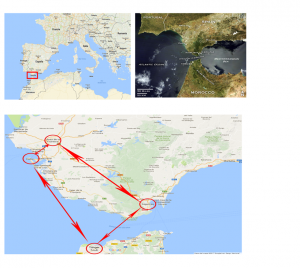
Previous logo:
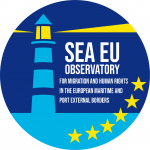
NOTICIAS RELACIONADAS:
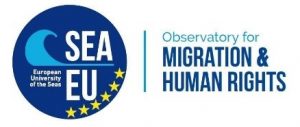


III Jornadas “Inmigración, Derechos Humanos y ONGs en el Mediterráneo – un debate pluridisciplinar”.
